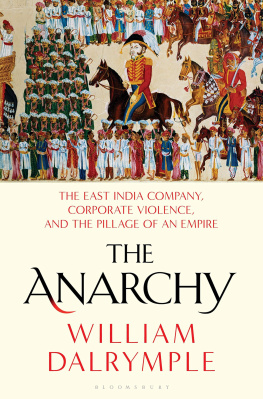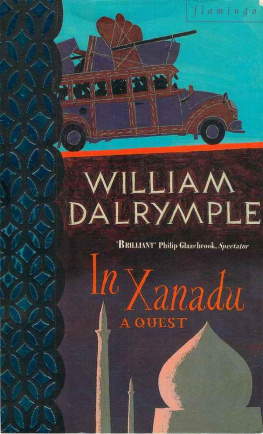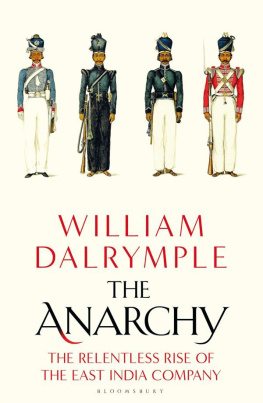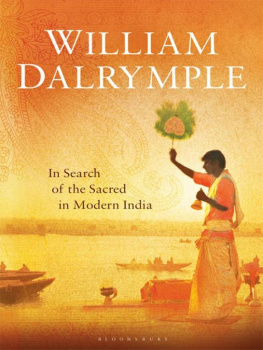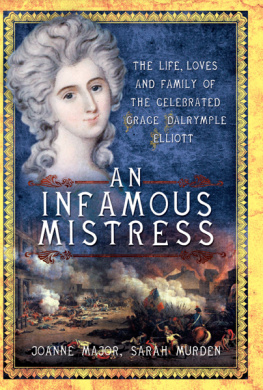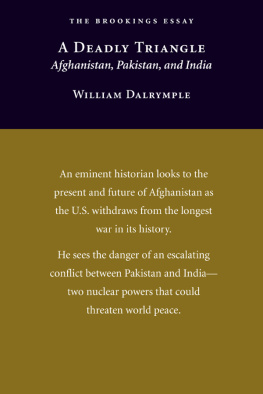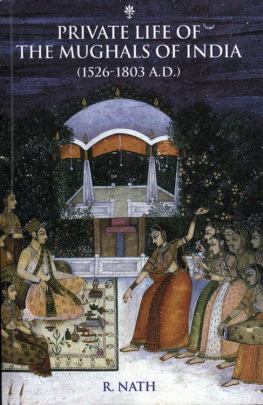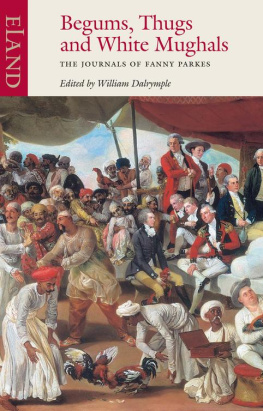William Dalrymple - White Mughals: Love and Betrayal in Eighteenth-Century India
Here you can read online William Dalrymple - White Mughals: Love and Betrayal in Eighteenth-Century India full text of the book (entire story) in english for free. Download pdf and epub, get meaning, cover and reviews about this ebook. year: 2004, publisher: Penguin Group (USA), genre: Art. Description of the work, (preface) as well as reviews are available. Best literature library LitArk.com created for fans of good reading and offers a wide selection of genres:
Romance novel
Science fiction
Adventure
Detective
Science
History
Home and family
Prose
Art
Politics
Computer
Non-fiction
Religion
Business
Children
Humor
Choose a favorite category and find really read worthwhile books. Enjoy immersion in the world of imagination, feel the emotions of the characters or learn something new for yourself, make an fascinating discovery.

- Book:White Mughals: Love and Betrayal in Eighteenth-Century India
- Author:
- Publisher:Penguin Group (USA)
- Genre:
- Year:2004
- Rating:4 / 5
- Favourites:Add to favourites
- Your mark:
- 80
- 1
- 2
- 3
- 4
- 5
White Mughals: Love and Betrayal in Eighteenth-Century India : summary, description and annotation
We offer to read an annotation, description, summary or preface (depends on what the author of the book "White Mughals: Love and Betrayal in Eighteenth-Century India " wrote himself). If you haven't found the necessary information about the book — write in the comments, we will try to find it.
William Dalrymple: author's other books
Who wrote White Mughals: Love and Betrayal in Eighteenth-Century India ? Find out the surname, the name of the author of the book and a list of all author's works by series.
White Mughals: Love and Betrayal in Eighteenth-Century India — read online for free the complete book (whole text) full work
Below is the text of the book, divided by pages. System saving the place of the last page read, allows you to conveniently read the book "White Mughals: Love and Betrayal in Eighteenth-Century India " online for free, without having to search again every time where you left off. Put a bookmark, and you can go to the page where you finished reading at any time.
Font size:
Interval:
Bookmark:
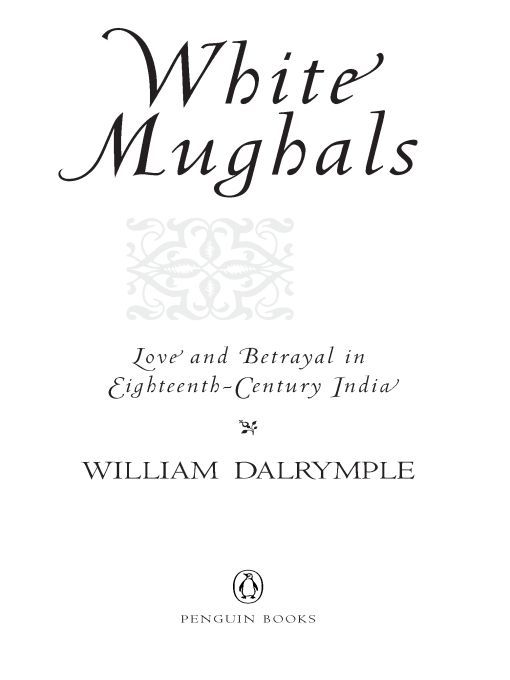
White Mughals is destined to become an instant classic. William Dalrymple has crafted a tale of romance and nostalgia that echoes in the ears like exotic birdsong. The history of India courses through his veins; the humanity of the past flows from his heart.
At the end of the eighteenth century, James Achilles Kirkpatrick, the promising young British Resident at the Shia court of Hyderabad , fell in love with Khair un-Nissa, an adolescent noblewoman and a descendant of the Prophet Muhammad. The story of their romance and semi-secret marriage endured in local legend and family lore but was otherwise forgotten. After five years work with a trove of documents in several languages, Dalrymple has emerged not only with a gripping tale of politics and power but also with evidence of the surprising extent of cultural exchange in pre-Victorian India, before the arrogance of empire set in. His book, ambitious in scope and rich in detail, demonstrates that a century before Kiplings never the twainand two centuries before neocons and radical Islamists trumpeted the clash of civilizationsthe story of the Westerner in Muslim India was not one of conquest but of appreciation, adaptation, and seduction.
A gorgeous, spellbinding and important book... A tapestry of magnificent set pieces and a moving romance. William Dalrymples story of a colonial love affair will change our views about British India.
Imaginatively conceived, beautifully written, intellectually challenging and a passionate love storythis is Dalrymples lifetime achievement and the best book he has ever written. He has done for India and the British what Edward Said did for the meeting between the West and the Arab world in Orientalism. Destroying the centuries-old stereotype depiction of the British in India and the myth of the British stiff upper lip, Dalrymple shows that the British did not merely conquer India, they were seduced by it (and Indian women). Despite its setting in the eighteenth century, this is a hugely important contemporary book. Dalrymple has broken new ground in the current debate about racism, colonialism and globalization. The history of the British in India will never be the same after this book. It is also beautifully written.
The cross-cultural romance between Khair un-Nissa and James Achilles Kirkpatrickthe gripping central narrative of this bookis an extraordinary tale.... Mr. Dalrymple first began exploring the mingling of East and West as a travel writer, and his sensitive memoir of a year in Delhi, City of Djinns, established him as Britains premier author on South Asia. In White Mughals he has pulled off a tour de force of scholarly research. Academics rarely let themselves get so close and the result is a veritable travelogue through the past, packed with detail and sense of place. The book breathes. You can almost smell the spiced meats in the Hyderabad biryanis or the flowering fruit trees Kirkpatrick planted in the Residency garden. Mr. Dalrymple researches like a historian, thinks like an anthropologist and writes like a novelist. It is a winning combination.
Masterfully demonstrating that truth can trump fiction, English travel writer Dalrymple relates a wrenching tale of loves labours lost on the Indian subcontinent. Dalrymple argues that the Brits went native a lot more than is commonly thought and that West can meet East when love is the lingua franca. Rigorously researched, intelligent, compassionate. A tour de force.
Anyone who fails to read William Dalrymples White Mughals owing to a lack of interest in India will be losing a rich reward. By following the love story of a British Resident in Hyderabad and a Muslim noblewoman, he goes deep into the relationship of East and West in the late eighteenth century when the twain did most certainly meet. A devoted andin this caseuncannily lucky researcher, Dalrymple offers a feast of often astonishing information and a cast of men and women ranging from the comic to the heartrending, but above all he writes in a way that draws you into his own enthusiasm for the subject. This is an irresistible book.
Dalrymples subject is the unlovely term transculturation, but his book has some lovely stuff about race, diplomacy, warfare and, especially, sex... A witches brew of deviousness, desire, ambition and astonishment.
A masterpiece.
Fascinating and enthralling... William Dalrymple unscrolls a wide panorama: a vivid and often turbulent panorama of India during the eighteenth century. Impressively researched, and written with vigor and panache, Dalrymple is a gifted narrator who brings vividly to life the dealings between the Indian princes and the East India Company. He brilliantly depicts some of the leading characters.
Brilliant, poignant, and compassionate, White Mughals is not only a compelling love story but it is also an important reminder, at this perilous moment of history, that Europeans once found Muslim society both congenial and attractive, and that it has always been possible to build bridges between Islam and the West.
A spellbinding story with massive scholarship, captivating flair and obvious empathy. This is history at its very best, at its most engaging and relevant... A superlative, groundbreaking story that fully justifies all the effort, all the costs, all the risks [it took to write].... At a time when Islamophobia is rising to danger levels in the West we need this reminder more than ever that once, however briefly, East and West met in tolerance and peaceand love.
Font size:
Interval:
Bookmark:
Similar books «White Mughals: Love and Betrayal in Eighteenth-Century India »
Look at similar books to White Mughals: Love and Betrayal in Eighteenth-Century India . We have selected literature similar in name and meaning in the hope of providing readers with more options to find new, interesting, not yet read works.
Discussion, reviews of the book White Mughals: Love and Betrayal in Eighteenth-Century India and just readers' own opinions. Leave your comments, write what you think about the work, its meaning or the main characters. Specify what exactly you liked and what you didn't like, and why you think so.

